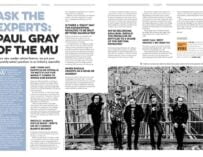
David Stark, founder of SongLink
The founder of long-running songwriters’ tip-sheet SongLink demystifies the process of pitching songs to A&Rs and imparts some invaluable advice
![]() perating for more than 20 years, SongLink is one of the most well-known tipsheets, providing up-to-date and accurate ‘who’s looking’ leads and information to hundreds of subscribers across the globe. Edited and published by music business veteran David Stark, SongLink‘s subscribers include music publishers, independent companies, professional songwriters, along with selected unsigned writers, who must meet certain standards in order to subscribe.
perating for more than 20 years, SongLink is one of the most well-known tipsheets, providing up-to-date and accurate ‘who’s looking’ leads and information to hundreds of subscribers across the globe. Edited and published by music business veteran David Stark, SongLink‘s subscribers include music publishers, independent companies, professional songwriters, along with selected unsigned writers, who must meet certain standards in order to subscribe.
David has been in the music business for over 30 years, working for such companies as Dick James Music, Decca Records, MAM Records and Billboard, before launching SongLink International in 1993. David has also acted as an official research consultant to the Ivor Novello Awards and the World Music Awards, and is a member of the voting academy of the UK’s Brit Awards. He is also an occasional songwriter himself, and plays guitar and drums.
Here we ask David to explain the story of SongLink, to dispel some of the myths of songplugging and advise how songwriters should pitch their songs to A&Rs and publishers…
How did SongLink come about?
“In the 80s there was a tip-sheet called Song Plugger that was run by an American guy who worked for Warner/Chappell. I got to know the guy who owned it and he asked me if I wanted to take it over. I was flattered to be asked, but at that time it was a little bit too much for me to start out on my own. I went to work for Billboard in Amsterdam, running a directory for the European music industry, then came back in 1990 and worked for MIRO (Music Industry Research Organisation) who’d bought Song Plugger, so I ended up running it for them. I turned it from a three-page tip-sheet into a magazine with songwriter articles, news, who’s doing what, plus the leads. That became quite popular and I was doing that for a quite a while, until MIRO went bust. So in September ’93 I started up SongLink with the same format, sent out new subscription forms and everyone supported me. And that was it! That was 21 years ago.
[cc_blockquote_right] SONGS ARE STILL THE LIFEBLOOD OF THE BUSINESS… WITHOUT SONGS THERE ARE NO GREAT ARTISTS [/cc_blockquote_right]
What do you think has changed most about the industry over the past 20 years?
“Songs are still the lifeblood of the business, without doubt – without songs there are no great artists. But the way they’re being written and delivered these days has changed. The most noticeable thing is that, with all the big tracks on the charts, you’re seeing 6-12 names on the writing credits. Unfortunately, they’re writing by committee for a lot of the pop stuff and it’s very hard for new songwriters to break into those major name artists. Sometimes it’s A&R guys, engineers and producers getting their name on for putting in one word or note in. I’ve heard stories where songs that were written by just one or two people, but by the time it’s released it’s got another 10-12 other names on there. It’s been happening for years, even in the days of Tin Pan Alley, but I think it has gone a bit crazy these days.
“At the top end it’s a lot more of a closed shop. We’re running less major label leads these days because they’ve either got their own writer-producer teams or the A&Rs don’t understand the song-seeking process. There are some exceptions, but there doesn’t seem to be the same A&R guys that there used to be, who were passionate about finding the right song for the right artist. Most major labels have their 50 or so writer-producer teams that they’re working with, so we’re dealing more with the indie market. Then of course, there’s the other side with music for film, TV, advertising and licensing – that’s grown hugely over the years.”
How has Songlink changed?
“Well, the basic principle hasn’t changed. We’ve looked at putting the system online, but people seem to be quite happy sending MP3s by email. We send a list of leads with descriptions of the artist, a bit of background and what they’re after, along with a link straight to the A&R.”

Christina Aguilera’s smash hit Genie In A Bottle came from a SongLink lead
Are there any particular songs that famously got cut from SongLink?
“The biggest one was a lead originally from SongLink for Christina Aguilera, when she was just starting out. A songwriter called Pam Sheyne saw it listed, and she’d written a song with two guys in LA. They played a demo to the A&R guy, which he loved… it was called Genie In A Bottle and the rest is history! So I’ll claim credit for getting the ball rolling on that one. We had songs placed for Tom Jones, Cliff Richard, Tina Turner… in fact, I had a guy who took out a subscription, pitched his first song to Oleta Adams who immediately said, ‘Yes we want to cut this.’ He faxed me saying ‘David, this is great, does this happen every time?’ He got very lucky!”
Then we asked David what songwriters should bear in mind before sending demos to a record label or publisher…
Don’t just sing it yourself
“The biggest mistake is the songwriter trying to be the singer on the demo. They need to get the best voice possible on the demo to sell the song. The times I hear really awful, or under-par, voices ruin a good song. Everyone’s got a home studio set-up these days, but really unless you’re a genius it’s hard to do it all at home on your own without bringing in a session singer. The singer is the most important element.”
Remember who you’re writing for
“There’s a big difference between writing your own songs, for yourself, and writing songs for others. Writing to a brief is a very precise craft which has nothing to do with putting your own music out. That’s the mistake a lot of people make: they don’t understand what’s involved and how targeted you need to be if you’re trying to write for other people. It’s the ones who know how to do it and get it right on a consistent basis who are successful. It’s about writing exactly the right kind of material, making exactly the right kind of demo with great singers, and taking the care to get right virtually every time.”
Know the market
“You need to be particularly fanatical about listening to what’s on the radio and in the charts, then you can keep up with the current chart sound. It’s changing so much these days. You might think you’ve got a demo from 20 years ago and the song still stands up, but people aren’t interested if it hasn’t got a current chart sound. If anything, get a young whizz-kid producer to re-do it in today’s style, then you’ll have a better chance than if you send a demo that’s 20 years old.”
Give them what they want
“The other mistake people make is sending the wrong kind of music. Time and time again, people aren’t reading the briefs properly. Unfortunately you can’t just send anything and think the label can adapt it – they won’t. That’s probably the biggest complaint we get over the years – sending the wrong kind of music for the project.”
The system hasn’t really changed
“The people who are looking for the songs – the ones that do it properly – know they’re going to have to go through 100 songs to find one or two that are any good. It’s the same old system, but there are great songs still happening and it’s far from dead, and there’s great talent out there. It’s just harder for pure songwriters to know where to go. In the old days, people used to send demos straight to the A&R department of a label, and they’d be lucky if it got heard, but these days that’s never going to happen.”
It’s a lottery… but someone’s got to win!
“At the end of the day I always have to keep in mind that, for all the thousands of songs that get written and are pitched around the world, only a tiny percentage of them are going to get cut, and an even smaller percentage will go on to become worldwide hits. It’s still like a lottery, but someone’s got to get the cut. You’ve got to be in it to win it!”
Interview: Aaron Slater
David Stark’s SongLink is the most established and successful tipsheet on the market, having provided thousands of leads to its loyal subscription base of music publishers and songwriters, since 1993. To find out more about subscribing, take a look at www.songlink.com


































Hi, David, this is the Indian lady who had come over to your office just a few days back. I forget to tell you that Warner Music in Kensington were very interested in my songs [lyrics] a few years back. They wre after me to make a demo, which I did finally,but the demo was lousy—firstly I’m singing it, and I’m NOT a singer. So, they rejected it, but the girls who were dealing with me wre really very good and gave me back my demo—normally they don’t. In fact they liked my lyrics so they actually wanted to keep them—the sheets of paper.I’m NOT at all a technical person.
Good day David, I am a song writer from South Africa. I originally started writing songs for myself. As I do have a good voice according to voice trainers I never made use of. The fact is I was never in a position to afford proper voice training. I wrote I song I managed to produce a few years ago, this particular song almost won the Nashville songwriting competition in 2014. I got a mail from them saying I was in line to win. They offered me a package but at that time my life was spiraling down in a way you cannot imagine I lost everything except my family. I have a production on that one song but do not believe it was ever made for my voice? I am only getting back on my feet now. What do I do, I have 22 songs and lyrics I wrote, with huge potential.
As a rule Most A and R people would not bother with a Pitch sheet
that learning writers can post and advertise their songs
And Colin It sounds like The Nashville offer was a con to me